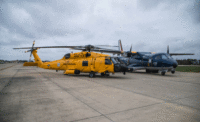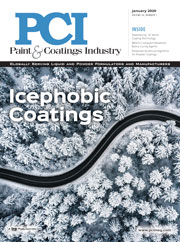PPG Installs Electrocoat Primer System at Coast Guard Aviation Logistics Center

PPG Industries’ aerospace coatings group has installed the first commercial system in the United States for application of its aerospace electrocoat (e-coat) primer to aircraft parts at the U.S. Coast Guard Aviation Logistics Center, Elizabeth City, N.C. The Aviation Logistics Center has reduced primer application and processing time from hours to minutes and full cure time from days to an hour with AEROCRON™ electrocoat primer.
Primers afford corrosion resistance to metal parts and enhance topcoat adhesion. Traditional primer is spray-applied, creating overspray and non-uniform film thicknesses that result in lower application efficiencies and higher coating weight. In the electrocoating process, metal aircraft parts are immersed into the Aerocron primer bath and then an electrical charge is applied. The primer is attracted to the charged part, resulting in uniform film thickness over the part, even in recessed and hidden areas. The water-based, chromate-free electrocoat primer produces near-zero waste and affords significant weight savings.
“This is a major step for the U.S. Coast Guard as a trailblazer in this needle-moving technology within the aerospace industry,” said Duane Utter, PPG Global Segment Manager, Military Aerospace Coatings and Defense Products. “We appreciate their confidence in PPG and will work with them to ensure their continued success. They have processed many parts successfully and are exploring opportunities for additional e-coat applications.”
The Coast Guard Aviation Logistics Center used PPG chromate-containing aerospace primers and advanced-performance topcoats when officials asked about PPG’s electrocoat technology. After successfully landing a contract, PPG designed a customized system to meet the Coast Guard’s process requirements.
“The transition to using the Aerocron e-coat primer application process is a tremendous advancement from traditional spray primer applications and will greatly help consumers like the U.S. Coast Guard work toward chromate and waste reduction initiatives,” said Ed Mullins, Sales and Market Development Manager at PPG’s Atlanta application support center. “Adoption of this revolutionary technology occurred quickly for the U.S. Coast Guard by involving people who routinely work in the plating shop at the Elizabeth City Aviation Logistics Center, which in some ways is similar to the e-coat process.”
In the e-coat process, after parts are pretreated, they are dipped into the Aerocron primer electrocoat bath, rinsed and thermally cured to achieve final coating properties. PPG makes the resin and paste components for Aerocron primer at its Oak Creek, WI, and Springdale, PA, coatings plants. These components are dispersed in water in a dip tank. The PPG system also includes an immersion rinse tank and a spray rinse tank, a cure oven and lab-related equipment.
Mullins and Robin Peffer, Research Associate at the PPG Coatings Innovation Center in Allison Park, PA, were on-site for a final cleaning and test operation of the system with water for the Coast Guard before filling the tank with primer and monitoring the system.
In addition to this first U.S. Aerocron primer tank, several pilot and production e-coat tanks have been installed in Europe for evaluation and operation by PPG aerospace coatings customers.
Electrocoat Primer Advantages for the Aerospace Industry
Electrocoating, also called electrodeposition coating and commonly referred to as e-coat, uses electrical current to apply a coating to a conductive substrate submerged in a water-based paint bath. The process can be fully automated.
Aerocron electrocoat primer is water-based for low solvent emissions. Compared with conventional spray priming, e-coat provides increased productivity and efficiency, affording nearly 100-percent material utilization and no overspray. Also, the e-coat process produces minimal waste because it returns rinses back into the electrocoat bath. Only the amount of primer needed is deposited onto the metal surface, which results in uniform film thickness and minimizes the weight of the finished part.
Aerocron primer is qualified to SAE International’s Aerospace Material Specification 3144 for anodic electrodeposition primer for aircraft applications.
PPG has been a leader in developing e-coat products for a half-century and was the first company to introduce e-coat technology commercially in an automotive original equipment manufacturer (OEM) assembly plant. PPG’s e-coat products currently protect more automobiles produced worldwide than do those of any other company. Additionally, PPG’s e-coat technology provides corrosion resistance to automotive parts, household appliances, computers, mechanical parts and other electronic devices.
Looking for a reprint of this article?
From high-res PDFs to custom plaques, order your copy today!









